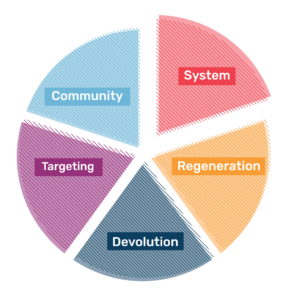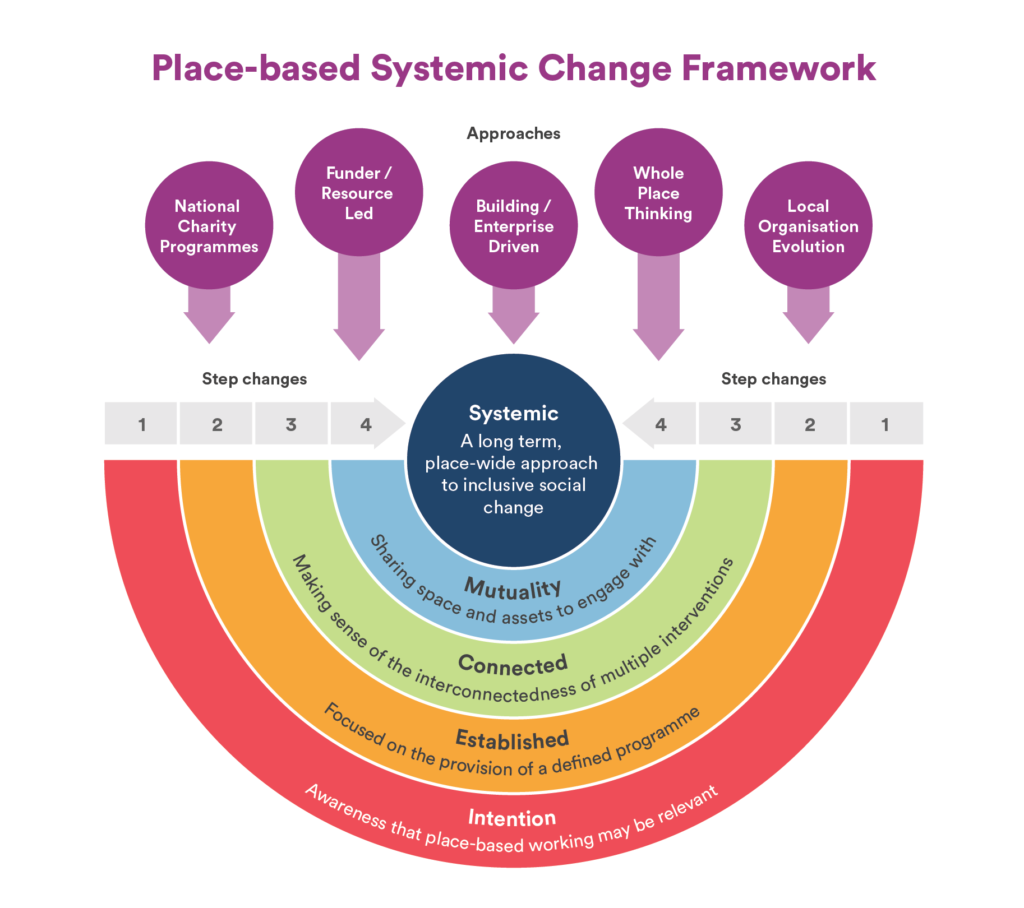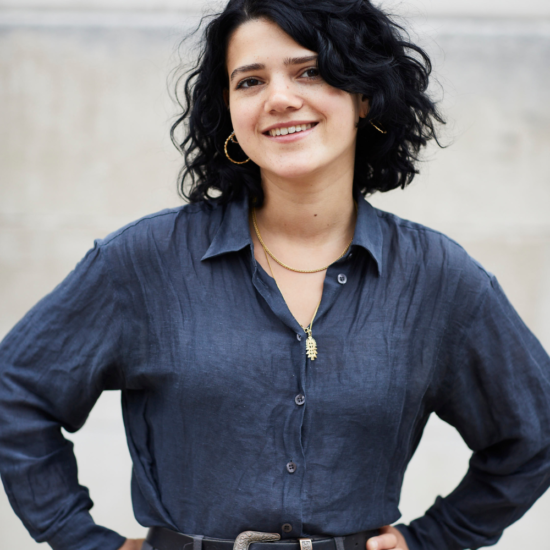Place-Based Change
Place-based working is an increasingly popular approach to social change but it has characterised most of Renaisi’s 25 years.
What is place-based change?
Place-based change is a long-term approach to identifying, understanding, and addressing social issues rooted in the experiences, expertise and relationships that exist within a recognised geographic area.
Why place?
We believe in the power of place-based change because it is inclusive. Done well it values everyone’s contribution and perspective, not just the traditional wielders of power in civil society. These factors give place-based work the potential to have an impact across different parts of a local system and create more sustainable change than other interventions might.
Place is a really useful concept because it:
- resonates with a wide range of people who live or work there, which helps build a clear and understandable vision that many can buy into
- encourages a wider engagement of people who might not be traditionally in formal decision-making spaces, but are stakeholders in the place
- breaks down service silos and bureaucracies by focusing on a vision for long-term change in the place
- brings focus on sustaining relationships that engender long term resilience and support, without being limited to any one need
Types of place-based change
Place-based change has been used to describe a range of approaches from government-led regeneration in a specific geographic area to local partnerships aimed at achieving issue-based change. In most cases, it is more than just a term to describe the target location of funding or action. We have found that there are five broad categories of place-based change.

Place as regeneration – this is a view of change as being about fixing a problem that has affected the economy of the whole place. “That place needs regenerating”. It negatively frames the place, and therefore judges the interventions around their value in fixing the problem.
Place as targeting – this is about seeing change as coming from evidence-based interventions that target resources on places that best fit their approach and work with the context of those areas. “That places lags behind in certain ways”. It can be deficit based, like regeneration, but is typically targeted on a specific social issue or challenge.
Place as devolution – this is a view of change that would result from localising decision making, and potentially tax raising powers, to more local forms of government. “That place needs to take powers back from Whitehall”. t frames the place as being held captive by decision makers that are either malevolent or, more often, not close enough to understand the local realities to make good decisions in service of that place.
Place as the community – this is a view of change that sees local people as the real sources of knowledge, strength and ownership of a place, and any work must be done with them. “That place has an incredible community”. It is asset-based in its assumption, and creates geographies, ownership and decision making that are legible to local people.
Place as a system – this is a view of how change emerges from systems of relationships between institutions such as public services, charities, and the community. Places are ways to geographically bound and define the system that emerges from those relationships. “That place needs to think about the whole system, not just the parts”.
Read more on Renaisi’s definition and categories of place-based work.
A framework for place-based systemic change
This framework for how to progress place-based systems change work was developed in partnership with Save the Children and others. The core assumption of the framework is that there is more similarity across approaches to social change than the language that describes those approaches would suggest.

Read more about the funding for place-based systemic change project here.
Community of practice
The place-based change community of practice is open to anyone working in a place or places that identifies with the principles of place-based systemic change. It is predominately for organisations delivering work, some engaged funders also attend.
Find out more about the community of practice.

- Find out more
- Contact Kezia del Carmen (formely Jackson-Harman) on:
- 2045244916
- k.jackson-harman@renaisi.com
Our history of place-based working
A timeline of some of the place-based work and projects Renaisi has been involved in.
Urban regeneration and the start of Renaisi
City Challenge
Much New Labour era thinking on investing in was linked to social and economic concerns about urban areas. The Government invited local authorities to draw up programmes of action to tackle their key neighbourhoods. Authorities expected to draw upon the wealth of talent and expertise within their cities. Renaisi founders were involved in the City Challenge in Dalston, North London and this work helped shape the creation of Renaisi in 1998.
Collaborating to improve a place
Single Regeneration Budget
Renaisi was involved in the management of many Single Regeneration Budgets across East London, which pulled together different government programmes and funding streams to try and simplify funding to better support local regeneration projects.
These years taught us a great deal about the challenges of investing in place and working in partnership and about the importance of local diversity.
Investing in Hackney
Invest in Hackney
In our early years, Renaisi did a great deal of work supporting Hackney Council and the borough of Hackney. One of our proudest and most important programmes of that time was the running of the inward investment agency, Invest in Hackney. It taught us a great deal about the borough, about the role of the private sector in a place, and about how local economies change.
Managing significant, long term government investment in a place
EC1 New Deal for Communities
The government experimentation in place-based investment, which started with City Challenge, ended with the enormous New Deal for Communities programme.
NDC ran across 39 neighbourhoods in England and Renaisi did a wide variety of work with many of those neighbourhoods. We ran the EC1 NDC from start to finish, managing all aspects of that £52million investment in one neighbourhood in South Islington.
What we learnt in that time shaped a great deal of how Renaisi thinks about place now.
Developing a learning community of regeneration practitioners
Renewal Academy
For four years Renaisi managed the DCLG’s national learning programme to equip practitioners with the tools and knowledge to improve quality of life in neighbourhoods.
Running the Academy taught us a lot about how to run communities of practice and learning events.
Being ambitious about community-led change
Big Local
We were part of the consortium that helped establish the Big Local programme in 2011, which established Local Trust and has gone on to do much more than Big Local.
Big Local gave 150 communities at least £1m with no strings attached to use as they see fit. Renaisi managed the professional advisors to the 150 areas, developing learning, support and collaboration for those individuals and the places. We continue to work with Local Trust on projects like Measuring Change.
Bringing together private, charitable and social enterprise sectors
Our Parklife
Renaisi helped establish Our Parklife in partnership with charity and private sector partners, and we still sit on the board. The CIC was designed to help lock in the employment, volunteering and social benefit of the Olympic Games into the park, which straddles four North London boroughs, post 2012.
Unlocking the capacity of communities to take a lead in their neighbourhoods
DCLG Neighbourhood Planning & Capacity Building Evaluation
In 2015/16 when the Conservative government wanted communities to become more self-reliant and to take advantage of new powers available to them to improve their local areas, Renaisi worked in partnership to design and deliver the DCLG’s Neighbourhood Planning & Capacity Building programme. The programme was delivered in six deprived areas of the country.
This programme emphasised to us that neighbourhood planning is not a linear process and neither is community engagement. It is messy, iterative and opportunistic, and literacy or language issues serve as additional barriers to engagement in many communities.
Helping social sector organisations to design, appraise, evaluate and learn.
Impact and Evaluation team formed
Applying our experience of programmes like the EC1 New Deal for Communities, we began supporting charities to design, appraise, evaluate and learn about the impact of their services. Over the last 10 years, this research and evaluation service has grown and become an integral part of what we do.
The movement from significant Government investment into austerity, has taught us a great deal about questions of value, impact, implementation, how organisations learn, build strategy and make decisions. Read more about our research and learning consultancy
Working in and with communities in South and North London
Work Programme
In Hackney and Lewisham, we ran numerous locally commissioned employability programmes so in 2010 we invested heavily in scaling our support for economically excluded people with the new Work Programme.
This work meant we developed roots in Lambeth and Southwark and deepened our knowledge of the needs of people in East London. It also taught us a lot about the strengths (and weaknesses) of payments-by-results as a mechanism of public policy funding.
We still offer employment and advice services in North and South London
Understanding and supporting marginalised communities
Community inclusion work
In 2016 we took on a small service in Islington to support families who did not speak English engage with their child’s school. We grew that work beyond Islington and beyond schools to support families with their English, understanding of local services and social issues like parenting, wellbeing.
It taught us lots about the role of language and refugees in community development, and directly led to us developing a highly successful programme for refugees and migrants. Read more about RISE
Addressing local priorities through social action
Place Based Social Action
The Place Based Social Action is jointly funded DCMS and the National Lottery Community Fund. It provides approximately £4.5 million funding to enable people, communities, local non-statutory organisations and the statutory sector to work collaboratively to create and take action on a shared vision for the future of their place.
This programme was the first time Renaisi combined evaluation expertise to our place-based experiences, exploring new methods and new insights. Renaisi is the evaluation and learning partner for the programme to 2024.
Shaping place-based systemic change work
Place Based Systems Change Community
Building on our long-term interest in place, we worked with Save the Children UK and partners to explore how to best manage funds to support place-based systemic change.
Shaping how place-based working is understood and implemented across the UK is a significant strategic direction for us in the coming years.
Inquiry into what it takes to change a system
Renaisi has always believed in the power of place to support people to thrive. Over 25 years, we learned what it takes to improve a place and from there, what it takes to change systems in a place.
We’ve drawn on all our learning to date to develop the tool for our systems change inquiry. It includes three themes that we think are critical to systemic change:
- Learning about the system and your role in it
- Deep and active collaboration
- Changing what’s valued and accepted
A solution to the challenges of evaluating place-based systems change
Renaisi’s new model combines our wealth of experience in developmental learning and evaluation approaches with ‘realist evaluation’ methods, such as contribution analysis to assess the causal links between a programme and the outcomes – adding more rigour to the overall method, without losing the critical learning about the process.
In addition to this our model embeds methods that are participatory and inclusive and proportionate.



